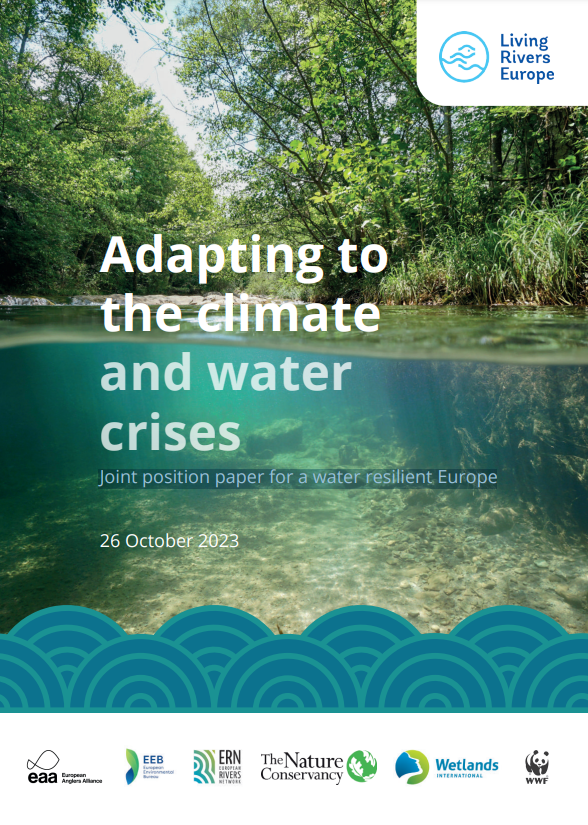Adapting to the climate and water crises
Joint position paper for a water resilient Europe
26 Octobre 2023
Ahead of the European elections of 2024, the Living Rivers Europe coalition of which the European Anglers Alliance is part, has adopted a joint position paper on the water and climate crises.
From heat waves to droughts, floods and forest fires, the impacts of climate change are growing in both frequency and intensity across Europe. All of Europe and all sectors of its economy are affected in different ways, but there is a common factor: climate change impacts are frequently felt through excesses or shortages of water (
WWF, 2020).
For decades we have been overexploiting and degrading our water resources, and this has affected all the services that healthy rivers, lakes and wetlands provide, including aquifer recharge, water purification for drinking water, and healthy soil moisture levels for farming, while also resulting in an unprecedented loss of aquatic biodiversity and habitats. Climate change is now exposing the dangers of continuing with this approach (
WWF, 2023). Improving the way we manage water and use the land in the catchment area is key to adapting to climate change, just like reducing carbon emissions is key to mitigating climate change. This should not mean building more grey water infrastructure to contain, transport, pump or store water. Building new dams, implementing large-scale water transfers and channelling riverbeds should be avoided, as in most cases heavy infrastructure only increases vulnerability to climate change impacts in the long run.
At the core of a water and climate resilient Europe is changing the way we value and manage water. The priority for adapting to the climate and water crises should be to protect and restore freshwater ecosystems and re-establish natural or near-natural water regimes. To ensure clean and sufficient water for people, we must maintain healthy freshwater ecosystems for nature. Healthy freshwater ecosystems replenish aquifers, sustain the water cycle, and ensure that rivers, lakes, wetlands, and groundwater are in good condition.
This means rewetting wetlands so that they can absorb and filter water and store it in the ground. It means re meandering and reconnecting rivers to their floodplains to ensure natural flows and sustain riverine habitats. It also means extracting only the amount of water we need for sustainable farming and drinking water in the most water-stressed areas. While some work should be done at Member State level, there is also a strong need for the EU to guide, coordinate and drive Member States’ water and climate adaptation action, in a more stringent way than the current
EU Climate Adaptation Strategy does. Despite strong EU nature, water and climate legislation, a large challenge still remains to ensure coherence between the various relevant EU policies, and to improve their implementation.

OUR ASKS
Ahead of the EU elections, and as a contribution to the initiative for water resilience proposed by European Commission President Von der Leyen, we call for:
- A FULLY IMPLEMENTED EU GREEN DEAL to build a resilient Europe, mitigate climate change, halt biodiversity loss and limit resource use, including water. This includes the urgent adoption of an ambitious EU Nature Restoration Law, and using the National Restoration Plans to enhance nature-based climate change adaptation.
- A NEW WATER AND CLIMATE RESILIENCE LAW setting a requirement for Member States to create EU Natural Water Reserves to protect critical water supplies and their catchments in water-stressed areas. These would become part of the EU’s water infrastructure, the protection and restoration of which should be of overriding public interest. In addition, the Law should provide adequate finance for upscaling the restoration or protection of floodplains, rivers, wetlands, and natural water retention measures, for instance through an EU Sponge Facility. It should also launch a framework for the setting of sectoral water efficiency and water abstraction targets at basin level, covering all water users.
- THE FULL ENFORCEMENT OF THE EU WATER FRAMEWORK DIRECTIVE including an increase in the European Commission’s legal resources to deal with the current backlog of pending complaints and cases.
- CLIMATE ADAPTATION PROOFING OF ALL NEW EU LEGISLATIVE AND NON LEGISLATIVE ACTS by an independent, scientific “Adaptation Panel” which would screen all EU measures and legislative proposals and ensure the integration of climate change adaptation into sectoral plans affecting water and land use.
- THE ELIMINATION OF EU SUBSIDIES FOR ACTIVITIES WHICH ARE HARMFUL TORIVER MORPHOLOGY, WATER QUALITY, NATURAL WATER RETENTION IN THELANDSCAPE, AND GROUNDWATER, in line with target 18 of the Global Biodiversity Framework.
DOWNLOAD THE FULL POSITION PAPER HERE